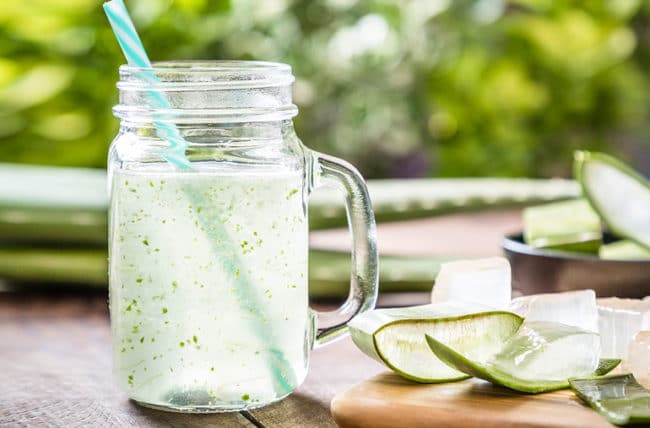Many cooks at home keep an aloe plant in the kitchen for soothing emergency burns and minor skin scrapes, but did you know you can drink it, too? Yes, the aloe vera water.
Aloe vera plants are some of the easiest to grow and maintain, but when it comes to their components, these plants can do more than add character to a living space.
Have you ever cut a leaf from an aloe vera plant and applied the cold gel to your sunburn? Aloe vera is a plant species with various medicinal and nutritional uses.
The plant has gel-filled green leaves. Many people use gel to treat burns, wounds, and skin infections. It is a traditional home remedy that has been used for centuries.
Previous research shows that people in Greece, Egypt, Mexico, India, Japan, and China have used aloe vera for centuries for its purported health benefits. But what about today?
In addition to topical application, aloe vera gel is often mixed with water and sold commercially as aloe vera juice or aloe vera water.
It is touted as helpful in relieving digestive issues such as constipation, and it is praised for its hydrating effect, helping to control blood sugar and other medicinal benefits.
Believe it or not, drinking aloe vera juice is one of the best ways to reap the plant’s health benefits. This article will teach about drinking aloe vera water or juice, its potential health benefits, and possible side effects.
A Brief History of Aloe Vera Water
It makes sense that aloe is one of the oldest plants in the world, a favorite of traditional cultures, and historically used to relieve all kinds of ailments— Even the Egyptians, six thousand years ago, called aloe vera “the plant of immortality,”—whether for digestive problems, fever or more esoteric, spread it over the body to avoid sweating as hunters do in Congo.
The plant is native to sub-Saharan Africa, but its easy cultivation means it is now quite widespread and likely on your counter.
Nutrition and Health Information
According to the USDA, a cup of plain aloe vera juice/water contains about 40 calories. Pure aloe vera juice has nutritional, antioxidant, and antimicrobial properties.
Research has shown that the health value of aloe vera juice lies in over 200 active ingredients from the plant, including anthraquinones, vitamins, minerals, amino acids, enzymes, fatty acids, and natural sugars.
Some commercial brands of aloe vera juice contain sugar to add a twist to the bitter taste, so you can always check the labels to see how much sugar is in your drink. Some may contain as much sugar as soda.
Aloe vera water or juice is often touted as a laxative and a way to heal the digestive system. Due to its high antioxidant content, aloe water is recommended to help protect against free radical damage caused by environmental causes such as sun and smog.
It can also be promoted as an anti-inflammatory that treats skin problems or as a way to lower blood sugar levels. There is also a lot of hype about using aloe vera water for weight loss.
Although several animal studies have been conducted, there has been very little human research. Until more research is done, going overboard by drinking gallons is unnecessary.
Aloe vera supplements have also been used as diuretics; however, if taken in excessive amounts, they can flush potassium out of your system, which is potentially dangerous.
However, aloe vera water is often used in detox programs. Although its diuretic effect may cause weight loss, it will most likely be gained back very quickly.
Also, your liver’s job is to cleanse or detoxify your body, and you don’t need the help of aloe or anything else.
Research on the Benefits of Aloe Vera Juice/water
Some research has been done to determine the health issues that aloe vera juice can help. But remember that aloe vera juice is not an official treatment for the following conditions and may not even relieve symptoms for some people.
Always talk to your doctor so they can determine the best treatments for you.
1. Laxative Effect
Aloe vera has an established laxative effect, but it is specifically bound to the outer pulp of aloe leaves, known as latex. It is the part of the plant that contains the anthraquinones called aloin, which is probably responsible for the laxative effect.
If you’re looking for a juice that helps relieve constipation and acts as a mild laxative, choose the one made with aloe vera gel and latex (often called “whole leaf”). Read the labels to be sure, or ask your pharmacist.
2. Digestive System Health
Aloe vera gel and juice have anti-inflammatory fatty acids that help regulate the proper functioning of the colon, small intestine, and stomach. And it is associated with better digestion.
Aloe vera can also help relieve symptoms of irritable bowel syndrome. A meta-analysis found that people with IBS who took aloe vera juice saw more improvement in symptoms than those who took a placebo.
3. Heartburn
A randomized controlled study of 79 people found that those who took aloe vera syrup once daily experienced similar relief from heartburn symptoms as those who took prescription medications.
4. Alternative to mouthwash
In a 2014 study published in the Ethiopian Journal of Health Sciences, researchers found that aloe vera extract is a safe and effective alternative to mouthwashes made from organic chemical products.
Natural plant ingredients, including a healthy dose of vitamin C, can block plaque. It can also provide relief if you have bleeding or swollen gums.
5. Skin Health
Studies show that aloe vera can help heal epithelial tissue after injury and help skin heal. The aloin in aloe is known to have an anti-inflammatory effect, another property that makes it beneficial for the skin.
But remember that most of the studies on the benefits of aloe vera for the skin are for topical use and not for juicing. Little is still known about how taking aloe vera juice affects the skin.
6. Diabetes
Previous studies have found evidence that aloe vera may help lower high blood sugar and cholesterol levels in people with type 2 diabetes, but these studies have not been up to date.
There are no randomized clinical trials to confirm these effects, and previous studies have been animal or observational.
A 2016 systematic review concluded that aloe vera might improve blood sugar control, but the evidence is limited, and more research is needed before specific recommendations can be made.
7. Breast Cancer Potential
A new study that has also been published in Evidence-Based Complementary and Alternative Medicine examined the therapeutic properties of aloe emodin, a compound found in the leaves of the plant.
The authors suggest that the succulent shows the potential to slow the growth of breast cancer. However, further studies are needed to advance this theory.
How Much Aloe Vera Water/juice Should You Drink?
As with anything delicious, be careful not to overdo it. One cup of aloe vera juice per day is a reasonable limit. “Drinking more will not necessarily benefit you more.”
The FDA has approved aloe vera as a dietary supplement, but food-grade aloe has not been tested as a medical or therapeutic agent. As such, aloe vera juice is unregulated, and there is no guarantee of potency, purity, or safety when purchasing this product.
Of course, this makes it difficult to determine the prescribed amount or dose, as each bottle may contain a different amount of aloe gel, latex, or aloin.
The food industry has set an upper limit of 10 ppm for aloin in consumable aloe products, such as juices, but the aloin content does not have to be labeled.
The National Institute of Environmental Health Sciences says there is very little data on aloin levels in consumer aloe products but notes that most liquids contain less than one part per million (ppm). It also makes it difficult to know how much to drink for a laxative effect.
“People can also think that if something is natural, you can have as much as you want.” That’s not true because studies have shown that just because something is natural doesn’t mean it doesn’t have harmful side effects.
Side Effects
Although some research has established the benefits of aloe vera water, there is also evidence that consuming it may have adverse effects.
A National Institutes of Health (NIH) study found that consuming non-decolorized aloe vera leaf extract tends to be associated with an increased risk of cancer in both male and female rats.
The researchers aren’t sure why the risk has increased, but they suspect that certain anthraquinones in the plant’s waxy leaves may play a role.
Specifically, they identified the compound aloin as a possible cause of cancer. As a result, many aloe vera juice manufacturers list the aloin content of their juices.
Although scientists have yet to replicate these human studies, limiting aloin intake may be a reasonable precaution. According to the Memorial Sloan Kettering Cancer Center, drinking aloe vera juice can cause stomach upset and electrolyte imbalance.
Drinking aloe vera juice in moderation is necessary. Stop drinking the juice if a person experiences an upset stomach or other symptoms.
Who Shouldn’t Drink Aloe Vera Water?
Aloe vera juice/ water is not recommended during pregnancy. Some believe that aloe can stimulate uterine contractions, which can increase the risk of premature labor or miscarriage. Breastfeeding people should also avoid aloe, as aloe can cause diarrhea in babies.
Aloe can irritate hemorrhoids, so don’t use it if you have this condition. Also, stay away if you have known kidney disease.
Aloe vera may also interfere with certain medications, such as certain heart and diabetes medications. Talk to your doctor or pharmacist before taking aloe water to avoid possible drug interactions.
The Bottom Line
Although aloe vera comes in many forms and has been used for thousands of years, there is still insufficient evidence to establish its effectiveness.
Aloe vera supplements were once a popular laxative, but the FDA says the supplement is not generally considered safe and effective. Instead, people now rely on small doses of aloe vera in juice or water for a laxative effect.
So, if you love the taste, there’s nothing wrong with relaxing with a bottle of aloe water occasionally. But keep in mind that excessive consumption of aloe vera juice can lead to diarrhea and stomach pain, so take it easy.
Finally, remember that there are differences between topical and oral aloe products. Do not swallow aloe vera gel, which is intended for use on the skin. If you use juice, make sure the product is food-grade.





